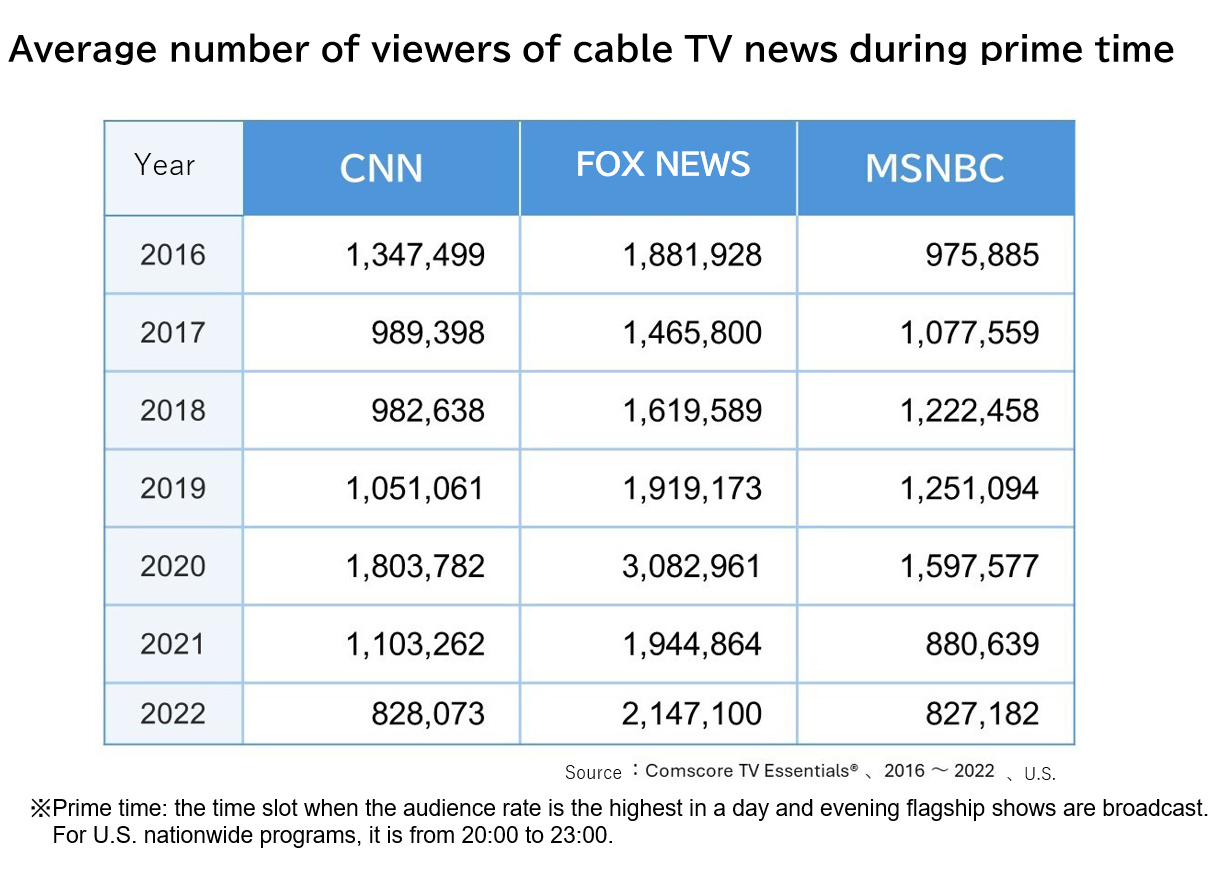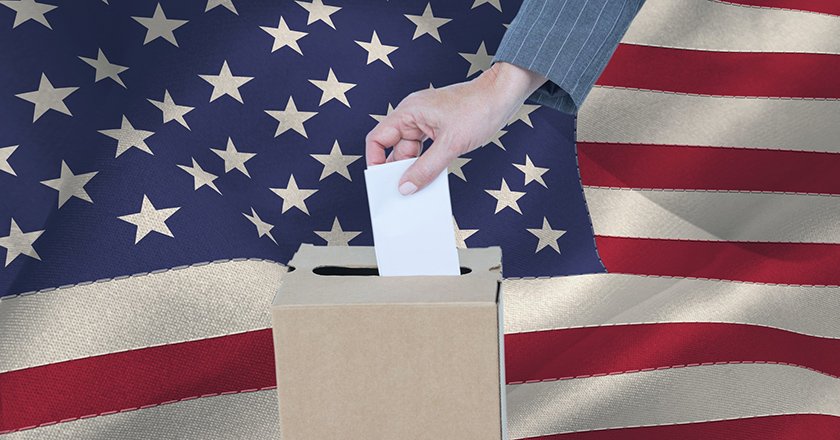FOX News attracts more viewers than CNN, which is well-recognized in Japan
The U.S. presidential election is attracting attention. The center of attention is of course the rematch since 2020 between current president Biden from the Democratic Party, and former president Trump from the Republican Party.
When I visited Washington, D.C. in March this year, it was around the time of “Super Tuesday.” On Super Tuesday, many states carry out the primary election. Since it is a crucial stage to elect party candidates for the two major parties, the media will also pay close attention to it. During this period, there was already severe competition among media reports concerning Biden versus Trump, in anticipation of the general election in November. Some express anxiety by saying “it is problematic if Biden loses, but even if he wins, wouldn’t something like the 2021 United States Capitol attack occur again?” Also in Japan, expressions such as “moshi-tora (what if it is Trump?)” are used in the media. Some supporters of the Democratic Party that I talked to in D.C. were even afraid of the presidential election itself. From now on, media reports will only become further overheated as the general election approaches.
In recent years, I have been especially interested in the stance of American media reporting of the presidential election. In this election there are multiple major issues such as immigration, abortion prohibition, and the economy. I am focused on media framing, or from what perspective each media outlet is going to report these issues as its news.
In the U.S., the cable news network Fox News is preferred by conservatives and is viewed by many supporters of the Republican Party. Some data show that the number of viewers of CNN and MSNBC combined, which are the news channels often watched by liberals, cannot reach the number of Fox News viewers. When Japanese media introduce reports by saying “according to local media” they often quote CNN and other prominent papers. However, I think that they should pay more attention to the fact that there is a large number of Fox News viewers in the U.S.

Fox News started in 1996 with the long-time criticism developed by the conservatives against the liberal media in mind. Many of Fox News’ viewers belong to the white working class and are supporters of the Republican Party. Fox News is characterized by popular news programs called soft news, which incorporate pop culture and entertainment factors. For example, Saturday Night with Jimmy Failla is hosted by a comedian and Gutfeld! is a program which parodies social issues. Sean Hannity, who has for years been hosting a prime-time program since Fox News started, is said to represent the most influential conservative voice. When I watch the program, country music is played, and cowboys appear in the commercials between the programs, and it reminds me of the good old days in America.
There are many liberals in D.C. where I often visit. When I am talking to academics and tell them that I watch Fox News, they give me a questioning look. However, when I think about the increasing number of viewers of the channel, I cannot ignore it when talking about the presidential election.
Increasing media competition and polarization in the U.S.
Let us look at what kind of language Fox News is actually using in its reports.
I will discuss the tone of Fox News reports around the time of Super Tuesday. Concerning immigration policy, which is an important issue in the 2024 presidential election, Fox News was stressing the view that Biden failed in his immigration policy over border control, focusing on immigrants and crime.
Another example is a news report on Candidate Haley, who announced her withdrawal from the Republican primary after Super Tuesday. Haley won against Candidate Trump in the primary at Washington, D.C. However, around that time, in the Fox News programs, there were comments worded as if to ask Haley to withdraw. There were relatively more college graduates among Haley supporters, and she was regarded as moderate within the Republican Party. On the other hand, there were many white working-class people among Trump supporters, and they overlapped with Fox News viewers. Because of such reporting behavior, which is strongly focused on these viewers, it is mocked by some American media scholars who say that Fox News is now Trump News.
Media bias in the U.S. does not only apply to Fox News. On the contrary, MSNBC, which opened its station in 1996 just like Fox News, is making reports focused on liberals. Conservatives prefer conservative media, and liberals prefer liberal media. In the U.S., competition among the media has become severe owing to the increase in the number of households that subscribe to cable TV and satellite TV services. It can be said that as a marketing strategy to keep winning, they have been using an approach to show the clear distinction between parties so that it is easy for viewers to understand. Some scholars point out that the partisan media influence how viewers understand and interpret elections. In fact, according to the Pew Research Center survey, in the 2020 presidential election, many of the people who thought that “postal voting causes a fraudulent election” gained daily information from Fox News, while there was almost no one who thought so among people who gained information from MSNBC or CNN. Therefore, I am concerned about the influence of partisan reports on the 2024 presidential election.
Precaution is also needed for the increased impact of AI on the election campaign
The term “fake news” attracted lots of attention in the 2016 presidential election. In recent years, generative AI has also been used, and it has become more and more difficult to distinguish fake news (disinformation/misinformation). Toward the 2024 presidential election, concerns for the spread of disinformation/misinformation by abusing AI tools are increasing. In May, I participated in the Digital Campaign Summit held in the suburbs of Washington, D.C. There they had thorough discussions about the concerns for the impact on the election because disinformation/misinformation created by generative AI is becoming more and more sophisticated. On the other hand, from the standpoint of a political consultant, one pointed out the advantage of using generative AI for the election campaign. In 2008, the Obama campaign, which made use of social media, caught attention. After that, the use of social media in election campaigns became more sophisticated. Similarly, expectations for becoming the forerunner of the new election campaign using generative AI from now on seem to be increasing.
A bill to regulate AI use in the election was submitted to the U.S. Congress. However, enforcement of the law is expected to take some time. Thus, it could be said that the shortest cut for now is for each business to work on its own measures. Major technology companies are taking measures to establish rules voluntarily. For example, Google made it mandatory to disclose the use of AI for election advertisements. Moreover, in February 2024, 20 major technology companies, including Google and Meta, signed the Tech Accord to Combat Deceptive Use of AI in 2024 Elections. However, we cannot say that this is sufficient in the current situation.
Cases of campaign obstruction by robocalls (automated voice calls) that misuse generative AI voices are also attracting attention. In January 2024, just before the Democrat’s New Hampshire primary, there was a campaign obstruction case, in which automated phone calls pretending to have the voice of President Biden told people not to vote. Against this, the FCC (Federal Communications Commission) promptly set out its measures. Based on the Telephone Consumer Protection Act, in February, it announced a new regulation stipulating that robocalls using AI-generated voices are illegal.
Now, there are concerns about content such as malicious fake videos heading towards the general election. Voters need to be even more cautious about election information than before. Nevertheless, unfortunately, it is difficult to be completely prepared. In recent years, also in Japan, fake videos have spread each time there is a disaster. That was also the case when the Noto Peninsula Earthquake occurred on New Year’s Day. In our modern society, social media has prevailed and the speed of information diffusion has become extremely fast. In such a society, not only researchers, but also the media need to judge the authenticity more carefully. In addition, the checking function of fact-check institutions is also important.
So, how should the public confront this problem? First of all, we are required to make an effort to capture accurate information. In March in Washington, D.C., when I talked to researchers and journalists who are very familiar with the media, they told me their views that basically in order not to be swayed by disinformation/misinformation during the election campaign, each individual’s media literacy was important. This is important, but will take considerable time. Now that the presidential election is imminent, I feel that the challenges seem to be larger.
A short-term measure is to stop only coming into contact with information that you like. The percentage of people reading newspapers and watching TV is decreasing in Japan as well. However, you should avoid biased information gathering by only looking at specific information via the internet. There is a risk that you may not escape from a specific way of thinking by becoming more embedded into the more limited information that you like than you think. We should be mindful to consciously encounter various media.
Nevertheless, in reality, it may be difficult to take the time to check so much media. Moreover, a fixed idea that is once ingrained in one’s mind is difficult to shake off. In the U.S., there are some people among conservatives who think that even PBS, which is a Public Broadcasting Service, must be liberal! I feel the difficulty of remaining neutral in our modern society.
On the other hand, there are quite a few people who are fed up with the overheated media rivalry over the presidential election. If voters become tired of terrible reports stirring up the candidates as if it was a horse race and engaging in a mud-slinging match without delving into policy issues, they could stop voting. Concerning the 2020 presidential election, owing to the movement by young voters, the turnout rate was unprecedentedly high. How will it turn out this year? I am paying attention to this, including the impact of the media.
Please try to check this year’s presidential election, paying attention to how the media report it.
* The information contained herein is current as of June 2024.
* The contents of articles on Meiji.net are based on the personal ideas and opinions of the author and do not indicate the official opinion of Meiji University.
* I work to achieve SDGs related to the educational and research themes that I am currently engaged in.
Information noted in the articles and videos, such as positions and affiliations, are current at the time of production.


